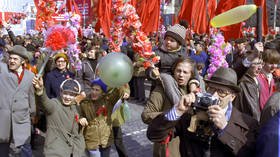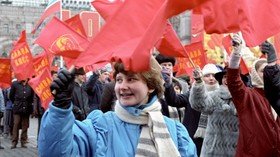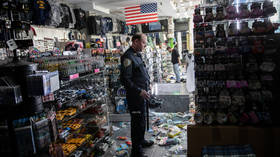What did USSR stand for? 1 in 5 Russians don't know

Around 20% of Russians don’t know what the acronym USSR means, and one in four can’t name a single republic that made up the Soviet Union before its collapse at the end of the 20th century, a new poll has revealed.
A study of 1,600 people, conducted by the Russian Public Opinion Research Center and published on Monday, found a large proportion of citizens struggled to recall details about the Communist state that spanned from Central Europe to the Far East for nearly 70 years. The poll uncovered the fact, for instance, that nearly a fifth didn’t know the official title of the Soviet Union was the Union of Soviet Socialist Republics.
Of the respondents, 11% admitted they didn’t know the meaning of the acronym, and 8% said they knew it but then incorrectly recalled it. In their defense, most of those in these two groups fell in the 18 to 24 age range, indicating that they were born years after the USSR’s dissolution.
The poll also measured Russians’ knowledge of the Soviet Union’s 15 national republics, which together constituted the USSR. Only 6% of those surveyed could name all 15. Nearly half of those under 35, and 27% of all respondents, couldn’t name a single republic. The most commonly forgotten republic was the Russian Soviet Federative Socialist Republic, which became the basis for the Russian Federation, the modern-day Russian state in which all the respondents currently live.
Respondents also answered questions about what they associated with the Soviet Union. The most common associations proffered were stability, peacefulness, and hope in a brighter future, which 21% of respondents said they connected with the USSR. Answers such as these were most common among those who had served in the armed forces, with people over 45, and with those who had graduated from higher education. The second-most common associations, at 13%, were positive emotions and pleasant memories.
The biggest negative connotations with the Soviet Union were shortages and long lines at stores, which 5% of people pointed to. These were particularly common during the Perestroika period of the 1980s, when economic problems led to widespread rationing. Only 1% of respondents said they connected the USSR with repression, terror, and the Gulag labor camps.
The results chime with those of another poll, published in 2018 by the Levada Center, which is registered as a ‘foreign agent’ by Russia’s Ministry of Justice because it has links to overseas funding. Of those surveyed back then, 68% said they regretted the fall of the Soviet Union, with its popularity higher among those born after the collapse of the Communist state. In neighboring Ukraine, which has dismantled most of its monuments installed by Soviet-era leaders, a poll in August found that 43% of people, mainly the older generation, believed things had been better back in the days of the USSR.














